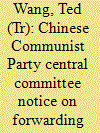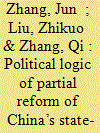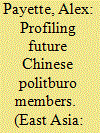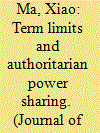| Srl | Item |
| 1 |
ID:
129261


|
|
|
|
|
| Publication |
2012.
|
| Summary/Abstract |
To the Xinjiang Autonomous Region Party Committee and the party committees of all provinces, municipalities, and autonomous regions; the party committees of all large military districts, provincial military districts, and field armies; all central ministries and commissions; the party committees of various ministries and commissions of state organs; all general headquarters of military commissions; the party committees of all services of the armed forces; and the party committees of all people'sorganizations:The "Central Secretariat Summary of Discussions on Work Issues inXinjiang"1is hereby issued to you. Please implement it and carry it out in connection with actual circumstances. This document is simultaneously issued to the Party committees of all provinces, municipalities, and autonomous regions for reference. On the morning of July 6, 1981, issues in the work in Xinjiang were once again discussed in accordance with the Resolutions on a Number of Historical Questions in the Party since the Founding of the People's Republic passed by the Sixth Plenary Session of the Eleventh Party
|
|
|
|
|
|
|
|
|
|
|
|
|
|
|
|
| 2 |
ID:
145826


|
|
|
|
|
| Summary/Abstract |
Informal connections play an important role in regimes all across the world, but among China's political elite, it is particularly factional affiliation that is said to structure contention over who will rule and who will fall victim to a purge. This article identifies two approaches to measuring factional ties in the literature: the exploratory approach traces alliance ties through qualitative assessment of insider sources, while the structured approach uses publicly available data to infer factions from shared characteristics. The article combines the two by arguing that informal politics is better conceptualized as a process of alliance formation shaped by an underlying social (network) structure. Among the structured approaches, coworker networks best capture the latter, but this can be further refined by noting the number of instances of working together, or by taking into account promotions that have occurred while the two individuals were coworkers.
|
|
|
|
|
|
|
|
|
|
|
|
|
|
|
|
| 3 |
ID:
152980


|
|
|
|
|
| Summary/Abstract |
By exploring the composition of the Chinese Communisty Party’s Central Committee since the 1990s, we analyze why state-owned enterprises reform has fallen into a partial reform equilibrium. We argue that two hypotheses, the interest group hypothesis and the adaptive power-sharing hypothesis, should be combined to fully comprehend the partial reform equilibrium symptom.
|
|
|
|
|
|
|
|
|
|
|
|
|
|
|
|
| 4 |
ID:
152342


|
|
|
|
|
| Summary/Abstract |
Efforts at finding the next Politburo members have, since the mid-1970s, been at the center of Chinese Elite and leadership studies. From the late 1980s onwards, leadership selection has become more institutionalized. This allows scholars to narrow down their search to more “propitious” elements in order to try to predict who might ascend to the Politburo. Consequently, this article ponders if it was possible to differentiate these individuals from their less “promotable” counterparts upon their entry into the Central Committee between 1992 and 2012. Based on statistical reassessment of variables commonly found in the literature, the article argues that soon-to-be Politburo members were already displaying a different profile than that of their counterparts 5 to 10 years before their entry into the Politburo. This article does not seek to establish a perfect predictive model rather than circumscribe the profile-type and environment in which these rising Elites can be found. Lastly, the latter opens a discussion on what to expect from the results as well as competing profiles found inside the Central Committee.
|
|
|
|
|
|
|
|
|
|
|
|
|
|
|
|
| 5 |
ID:
145828


|
|
|
|
|
| Summary/Abstract |
Term limits that effectively govern leadership transition play an important role in authoritarian power sharing. A fixed term and a pre-appointed successor – two crucial components of term limits – credibly commit the incumbent ruler to share power with other elites, and also allow the elites to monitor and coordinate against the ruler's transgression of the power-sharing agreement. While the successful adoption of term limits often requires an even balance of power among the ruling elites in the first place, once adopted it initiates an evolving bargain over allocation of political power among multiple generations of leaders that further keeps any one faction from dominating the others. I corroborate this argument using a biographical dataset of elite members of the Chinese Communist Party from 1982 to 2012. The findings suggest that the Party's incumbent leaders and their rivals (i.e., predecessor and heir-apparent) shared equal chances in promoting their associates—which proxy their political influence—and this pattern has become more salient since the 16th party congress, when the term limits that currently govern China's leadership transition became fully fledged. This result also sheds light on the role of informal, patronage-based promotion in the institutionalization of authoritarian politics.
|
|
|
|
|
|
|
|
|
|
|
|
|
|
|
|